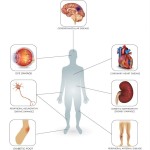- Home
- Dr Sultan Linjawi
Type 1 Diabetes
Type 2 Diabetes
Prediabetes
Gestational Diabetes
- Diabetes Information
- Testimonials
Why is mental health important in type 1 diabetes?

Why is mental health important when you have diabetes?
Taking care of your mental health is important and even more so when you have diabetes. If you have diabetes, you are at a higher risk of depression and anxiety, so taking care of all aspects of your health, both physical and mental, is extremely important for your wellbeing.
In children and adolescents, the impact of a type 1 diabetes diagnosis can be tough. Diabetes can have a huge impact on their lives, as well as the lives of their family. Mental health issues can be common in people with diabetes, including depression and anxiety. In a study looking at the psychological functioning of school-aged children, it was found that the presence of anxiety decreased in boys with type 1 diabetes, however increased in girls (Psychological Functioning of Children with Insulin-Dependent Diabetes Mellitus: A Longitudinal Study).
Type 1 Diabetes Content |
|---|
| Type 1 Program |
| Overview |
| Risk Factors |
| Symptoms |
| Diagnosis |
| Complications |
| Treatment |
| Diet |
| Monitoring |
| Tools |
| Mental Health |
| Prevention |
This may be due to girls feeling more upset about their diagnosis compared to boys. For older children and adolescents, family conflict may arise over the level of adult involvement in treatment and management of type 1 diabetes. Unfortunately, psychological issues like anxiety and depression, can lead to poorer glycaemic control which may further lead to an increased risk of hospitalisations due to diabetic ketoacidosis (Predictors of Acute Complications in Children With Type 1 Diabetes.
It is clear that our mental wellbeing is as equally as important as our physical wellbeing. It may perhaps be more important! If we aren’t feeling mentally well and are experiencing any anxiety or depression, it can impact the way we take care of our physical health. One great feature about the 12-week diabetes program, is that mental wellbeing is taken into consideration. Throughout the course of the program check-ins are conducted to see how you’re doing.
Mindfulness: Simple, yet it improves your overall health and diabetes management

You may be surprised to hear that there have been a few studies that have looked at the link of mindfulness and diabetes. Practicing mindfulness has been found to show many benefits for people who have diabetes. Read on to learn how mindfulness could help you.
Support in Diabetes Management: How beneficial is it?

Generally speaking, social supports influence diabetes management in both positive and negative ways. When considering adherence to diabetes treatment, the quality of the support is more important than how many people you have as a support. Finding a social network and support group that can influence you to maintain healthy behaviours, will be hugely beneficial in your diabetes management.
How to Communicate With Someone Living with Diabetes.

Communication is important. We communicate in many different ways (writing, speaking, or body language) and through many different forms – in person, on paper or via a technology device like a phone or computer. When you are communicating with someone who has diabetes, you may need to be more aware of how you communicate.
On the Cycle of Diabetes Burnout

Diabetes burnout can be real and affect a number of people. Diabetes management can feel a bit like walking a tightrope 24/7 between highs and lows. Without question, an enormous amount of time each and every day is dedicated to managing diabetes – just to ‘stay on the tightrope’ and survive. For someone without diabetes, it would be somewhat like telling the lungs to breathe or heart to beat – to remain healthy and alive.
Prioritising Self When You Have Diabetes - Is it selfish?

The answer for optimal wellbeing and survival is… we must be selfish. Many patients talk of how they put other’s needs before their own. It’s important to remember that you need to prioritise yourself at times, because if you don’t look after yourself then you won’t be able to look after anyone else!
Motivating Someone You Care About With Diabetes.

It can be heartbreaking and frustrating to witness a loved one not managing their health. You may feel hopeless as to how you could help them do more or to make changes suggested by health professionals that you know need to be made. Motivating someone with diabetes can be hard. But there are some things to consider to help increase motivation.
Good Stress, Bad Stress and Distress… Is it all too much?

Stress is well documented to have an adverse impact on our health. It can be destructive, but it can also be productive and for many of us. Essentially, we all need a little bit of stress as it is a necessary evil in our daily life. There are different types of stress, but how do they affect your diabetes?
Scales: Don’t always measure success.

If you’re on a weight loss journey as part of your health, you might feel compelled to check your weight daily. If monitoring your weight makes you consistently unhappy, or if you fear 'hopping' on the scales, you may want to consider not weighing yourself as often. It’s important to remember that what the scales say isn’t always a measure of your success!!
The Diagnosis of Diabetes: Is it more difficult than you'd anticipated?

The moment that you find out that you have diabetes can be quite difficult. It may even be more difficult than you anticipated. You may experience a wide range of emotions, including the five stages of grief: denial, anger, bargaining, depression, and acceptance. Read on to learn about three strategies that may help you at this stage of your life.
Yay… Did someone say “reward”?

Rewarding yourself is important. Rewards are important for a number of reasons (no wonder we love them!). Rewarding ourselves is important as it can motivate us, they acknowledge our hard word, and they can make us feel worthy. Read on to learn more about why you should rewarding yourself for all your hard work.
The Difficulties in Caring for Someone with Diabetes…

It can be hard caring for someone who has diabetes. You may feel helpless that diabetes is nothing more than a hindrance in life, a daily curse for all whom cross its path. And you’re not alone – however, it’s important that diabetes becomes less of a burden in life. Read on to learn how you can reduce the burden of diabetes.
Diabetes and Work: Friends or foes?

It’s true: money doesn’t grow on trees. That means, for many of us, we have to work in order to earn money to pay bills, buy food, and go about our daily lives. Many people who have diabetes, fear that they will be stigmatised at work due to their condition. This can cause them to change the way they manage their condition around their work or employment. But did you know that prioritising work over your health can result in demands for high blood glucose levels, just to get through work duties?
Too Busy to Manage Diabetes? How to fit it in your schedule.

If your day to day life is getting busier and busier, what does that mean for your diabetes? For a lot of people, a busy life of work, kids, other commitments, may mean that diabetes management goes by the wayside. We have a few strategies that can help you to incorporate diabetes management into your schedule.
Perfectionism in Diabetes Management: Do opposites attract?

Perfectionism in diabetes is a bit like ‘yin and yang’ or ‘chalk and cheese’ – they don’t go together. Striving for perfection in diabetes management is not only unrealistic, but can also result in disappointment, frustration, sadness, anger, low motivation or burnout for the person trying to achieve it. Why does this happen?
A Penny for your Thoughts: The true value of your thinking style and diabetes.

When it comes to thinking – we definitely can get caught in a trap. If it’s not a trap it can at least become a habit. It’s a bit like your accent, our thinking style can be so automatic and second nature we don’t generally think about what we are saying or doing to ourselves. So maybe we don’t really realise the times when our thinking style could be working against us. Accommodating basically an internal bully and not a cheerleader.
What should I do next?
If you have shown symptoms of type 1 diabetes, you should see your doctor at ask to be tested for type 1 diabetes as soon as possible. It is important to know that diagnosing type 1 diabetes should not rely solely on using a Hb A1c test. Fasting plasma glucose, random blood glucose, and oral glucose tolerance test are used when diagnosing diabetes.
Once you learn what your type 1 diabetes status is, the next most important step is to become educated. You can join the Type 1 Diabetes Program to help you learn how to prevent or delay complications associated with type 1 diabetes. The program is personalised, giving you more of the content that you want. The program also helps you to stay motivated and teaches you what changes you need to make.
What should I do next?
If you experience any symptoms of type 1 diabetes or you have risk factors for developing type 1 diabetes, it is important to get tested for as soon as possible. Some people are at higher risk and need regular testing.
By diagnosing and treating the type 1 diabetes early, it means you can decrease the risk of developing or delay any further health complications of type 1 diabetes, for example nerve damage, blindness, and heart disease. It is important to know that diagnosing type 1 diabetes should not rely solely on using a Hb A1c test.
Once you learn what your type 1 diagnosis is, or if you already have type 1 diabetes, the next most important step is to become educated. You can join the 12-week Type 1 Diabetes Program to help you learn how best to manage the condition. For example, you can learn how best to monitor blood glucose levels in type 1 diabetes. The program is personalised and tailored, giving you more of the content that you want. The program also helps you to stay motivated and teaches you what changes you need to make. The first week is free and full of helpful and crucial information.
Interested in more information on type 1 diabetes?
Follow the links below to learn more about type 1 diabetes.






